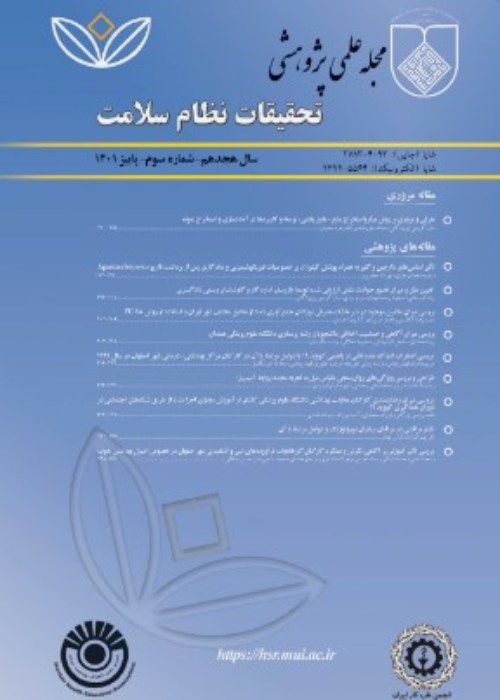The Relation between Health-Promoting Lifestyle and Quality of Life in Undergraduate Students at School of Health, Isfahan University of Medical Sciences
Author(s):
Abstract:
Background
Health promoting lifestyle (HPL) consists of six aspects including physical activity, nutrition, health responsibility, spiritual growth, interpersonal relations and stress management. This lifestyle promotes health and welfare, induces satisfaction, self-persuasion and self-improvement. Therefore, this study aimed to determine the relation between health-promoting lifestyle behaviors and quality of life among undergraduate students at School of Health, Isfahan University of Medical Sciences. Methods and Materials: This cross-sectional study was conducted on undergraduate students at School of Health, Isfahan University of Medical Sciences. A census sample of 81 subjects completed a survey questionnaire. Health Promoting Lifestyle Profile 2 was used in order to measure health promoting lifestyle behavior. Quality of life was measured the Farsi version of QLQ-C30 questionnaire whose validity and reliability have been confirmed before. Data analysis was performed using descriptive and inferential statistical tests in SPSS. Results
Mean age of participants was 21.12 years. In addition, 54.3% of the subjects were female and 45.7% were male. Spiritual growth and physical activity were respectively the most and least common subscales of HPL practiced. General quality of life of the majority of cases was good (40.7%). The highest and lowest frequencies of health-related quality of life belonged to very good (58.6%) and excellent (9%) scores, respectively. Except for stress management (P = 0.05), there were no significant relations between HPL aspects and gender. Female students performed self-care behaviors and relaxation techniques more than male students. Although spiritual growth was significantly related with general quality of life (P= 0.006), no significant differences were found between other subscales of HPL and general quality of life. In addition, health-related quality of life was significantly related only with stress management (P = 0.03). Conclusion
According to our findings, the majority of students had good general quality of life since 58.6% scored very good and 9% scored excellent in health-related quality of life. Finally, our findings showed that HPL, spiritual growth and stress management were positively related with global quality of life.Language:
Persian
Published:
Journal of Health System Research, Volume:7 Issue: 4, 2012
Page:
442
magiran.com/p958172
دانلود و مطالعه متن این مقاله با یکی از روشهای زیر امکان پذیر است:
اشتراک شخصی
با عضویت و پرداخت آنلاین حق اشتراک یکساله به مبلغ 1,390,000ريال میتوانید 70 عنوان مطلب دانلود کنید!
اشتراک سازمانی
به کتابخانه دانشگاه یا محل کار خود پیشنهاد کنید تا اشتراک سازمانی این پایگاه را برای دسترسی نامحدود همه کاربران به متن مطالب تهیه نمایند!
توجه!
- حق عضویت دریافتی صرف حمایت از نشریات عضو و نگهداری، تکمیل و توسعه مگیران میشود.
- پرداخت حق اشتراک و دانلود مقالات اجازه بازنشر آن در سایر رسانههای چاپی و دیجیتال را به کاربر نمیدهد.
In order to view content subscription is required
Personal subscription
Subscribe magiran.com for 70 € euros via PayPal and download 70 articles during a year.
Organization subscription
Please contact us to subscribe your university or library for unlimited access!



